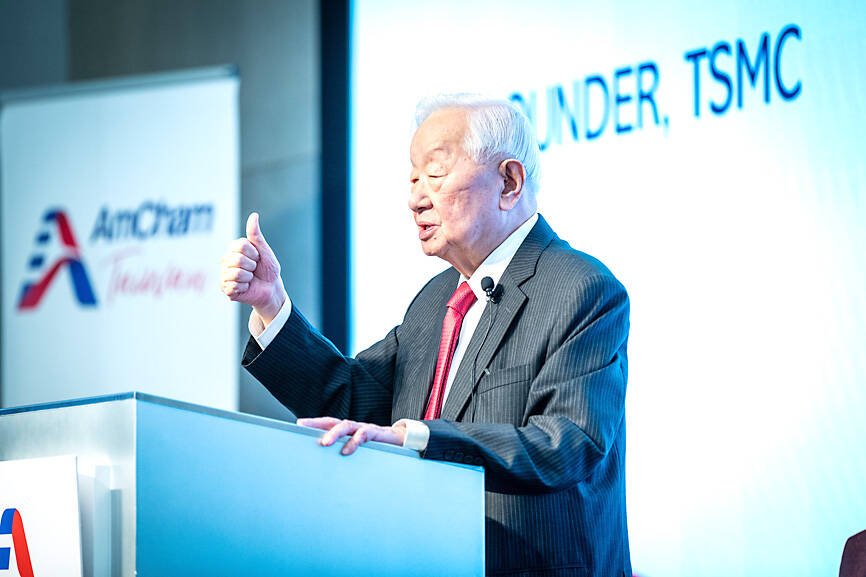The American Chamber of Commerce in Taiwan (AmCham) yesterday welcomed the positive evolution of Taiwan-US trade and economic cooperation after hearing a speech from Taiwan Semiconductor Manufacturing Co (台積電) founder Morris Chang (張忠謀) on Tuesday.
Chang last week attended the APEC leaders’ summit in San Francisco on behalf of President Tsai Ing-wen (蔡英文).
Chang achieved his goals of restarting the Economic Prosperity Partnership Dialogue, advancing a double taxation avoidance agreement with the US, committing to accelerating the schedule for stage two negotiations on the Taiwan-US Initiative on 21st-Century Trade and promoting cooperation to include third-party countries.

Photo courtesy of the American Chamber of Commerce in Taiwan
All of the issues have been of longstanding concern to AmCham, the organization said.
Chang shared memories of his early interactions with Taiwan during his time as Texas Instruments Inc global vice president in the 1960s, including discussions with then-minister of economic affairs Li Kwoh-ting (李國鼎), who has been dubbed “the father of Taiwan’s economic miracle.”
Li worked tirelessly to overcome intellectual property rights and land use challenges in establishing a Texas Instruments factory, which finally allowed the firm to take root in Taiwan, Chang said.
He said this initial experience involving US investment in Taiwan was an important milestone in the nation’s economic development.
Chang’s speech drew record attendance, AmCham said.
AmCham chairman Vincent Shih (施立成) also welcomed Patrick Lin (林博智) as the chamber’s president, saying his leadership and rich experience in industry and innovation would inject vitality into it and help it grow.
This is the most important moment in Taiwan-US relations in 40 years, Lin said.
Over the past year, AmCham has hosted a record number of US delegations that have included members of congress, state governments, think tanks and industry associations, as well as the four leading Taiwan presidential candidates in closed-door discussions with its members.
Lin said that AmCham would continue to promote economic and trade cooperation between Taiwan and the US, attract foreign investment in Taiwan and work with the government to align business operations in Taiwan with international standards, fulfilling its responsibility of helping to safeguard Taiwan’s future.

Hon Hai Precision Industry Co (鴻海精密) yesterday said that its research institute has launched its first advanced artificial intelligence (AI) large language model (LLM) using traditional Chinese, with technology assistance from Nvidia Corp. Hon Hai, also known as Foxconn Technology Group (富士康科技集團), said the LLM, FoxBrain, is expected to improve its data analysis capabilities for smart manufacturing, and electric vehicle and smart city development. An LLM is a type of AI trained on vast amounts of text data and uses deep learning techniques, particularly neural networks, to process and generate language. They are essential for building and improving AI-powered servers. Nvidia provided assistance

DOMESTIC SUPPLY: The probe comes as Donald Trump has called for the repeal of the US$52.7 billion CHIPS and Science Act, which the US Congress passed in 2022 The Office of the US Trade Representative is to hold a hearing tomorrow into older Chinese-made “legacy” semiconductors that could heap more US tariffs on chips from China that power everyday goods from cars to washing machines to telecoms equipment. The probe, which began during former US president Joe Biden’s tenure in December last year, aims to protect US and other semiconductor producers from China’s massive state-driven buildup of domestic chip supply. A 50 percent US tariff on Chinese semiconductors began on Jan. 1. Legacy chips use older manufacturing processes introduced more than a decade ago and are often far simpler than

STILL HOPEFUL: Delayed payment of NT$5.35 billion from an Indian server client sent its earnings plunging last year, but the firm expects a gradual pickup ahead Asustek Computer Inc (華碩), the world’s No. 5 PC vendor, yesterday reported an 87 percent slump in net profit for last year, dragged by a massive overdue payment from an Indian cloud service provider. The Indian customer has delayed payment totaling NT$5.35 billion (US$162.7 million), Asustek chief financial officer Nick Wu (吳長榮) told an online earnings conference. Asustek shipped servers to India between April and June last year. The customer told Asustek that it is launching multiple fundraising projects and expected to repay the debt in the short term, Wu said. The Indian customer accounted for less than 10 percent to Asustek’s

Gasoline and diesel prices this week are to decrease NT$0.5 and NT$1 per liter respectively as international crude prices continued to fall last week, CPC Corp, Taiwan (CPC, 台灣中油) and Formosa Petrochemical Corp (台塑石化) said yesterday. Effective today, gasoline prices at CPC and Formosa stations are to decrease to NT$29.2, NT$30.7 and NT$32.7 per liter for 92, 95 and 98-octane unleaded gasoline respectively, while premium diesel is to cost NT$27.9 per liter at CPC stations and NT$27.7 at Formosa pumps, the companies said in separate statements. Global crude oil prices dropped last week after the eight OPEC+ members said they would